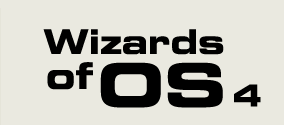|
|
|
|
|
The Planet of Free Knowledge The principle of Western science, the principle of free software, and the principle of non-exclusion are the path of development for the twenty-first century." (Eben Moglen)
The Wizards of OS 3 is bringing together an interdisciplinary group of leading scholars and practitioners from the planet of free knowledge. This planet is bustling with activity. Everywhere there are people creating and exchanging information, working together to build a solid foundation of free technology and to erect cathedrals of wisdom -- by all and for all -- such as Wikipedia. Some are laboring to bring science back to its philosophical foundations: an unencumbered exchange of ideas and the freedom essential for research and innovation.
The archivists on this planet are busy preserving the riches of the heritage of digital culture and making it easily accessible to all. Others are exploring new grounds in networking, whether it be wireless, peer-to-peer, social or political. And others are creatively working with the instruments of the law and the freedom of contract to defend the borders of this planet of freedom.
It is, after all, right next door to a different world. A world where knowledge and culture are enclosed within barbed wire and creative work takes place under non-disclosure agreements, its results encapsulated in law-hardened black-boxes. Here, there is a clear division between professional producers of information and culture and its consumers.
On the planet of free knowledge, in contrast, anyone is welcome to contribute. The PC and the Internet have unleashed the power of connective intelligence. The planet of knowledge manifests itself in man-made symbols and its form of governance is a "semiotic democracy" (William Fisher). Its inhabitants readily share for -- the very selfish reason of wanting to enrich one another.
On this planet, there are many currencies, monetary and otherwise, in which contributions to the common pool of knowledge are compensated. Currently, new systems for striking the right balance between the needs of the individual creator and her service providers and the needs of the Commons are being developed - systems that would strike a fair deal without the slightest need for any digital barbed wire. "Compensation, in other words, without control." (Lawrence Lessig)
The existence of the planet of free knowledge demonstrates three simple facts of life:
Freedom works. It works excellently for collaborative genome analysis, for software development, for encyclopedia production, for music samples, and many other forms of knowledge.
Freedom pays. That the total cost of ownership of free software is lower than that of proprietary software is evident. On the other hand, the price that society as a whole has to pay for privately owned secret technological foundations -- whether it be operating systems, standards, or search engines -- is much higher than one could imagine.
Freedom is a value that many people cherish. Who wouldn't want to be able to access freely and learn from the whole corpus of knowledge in a given field, as is the case with free software?
WOS 3 is a gathering of the inhabitants of this planet of freedom. A meeting of open minds and cultures. A powerful manifestation of the many-faceted Digital Commons.
WOS 3 will also raise questions. Many new challenges lie ahead. Many of the tools can be improved to serve the Commons even better. What new ambitious projects will emerge? On the planet of knowledge, the new lands to be discovered are only limited by our imagination. Since the planet of free knowledge and that of controlled knowledge are neighbors but their philosophies and social structures are so fundamentally different, frictions arise. How can they be solved so that both sides can live together in a good neighborly fashion?
"So long as the market paradigm is the only framework for thinking about the future legal environment for information and creativity, such questions will not even be asked. Talking about the commons, however, helps us initiate a new kind of dialogue and begin to build a broad-based movement to defend our common wealth." (David Bollier)
[^] top |
|
|
 |



